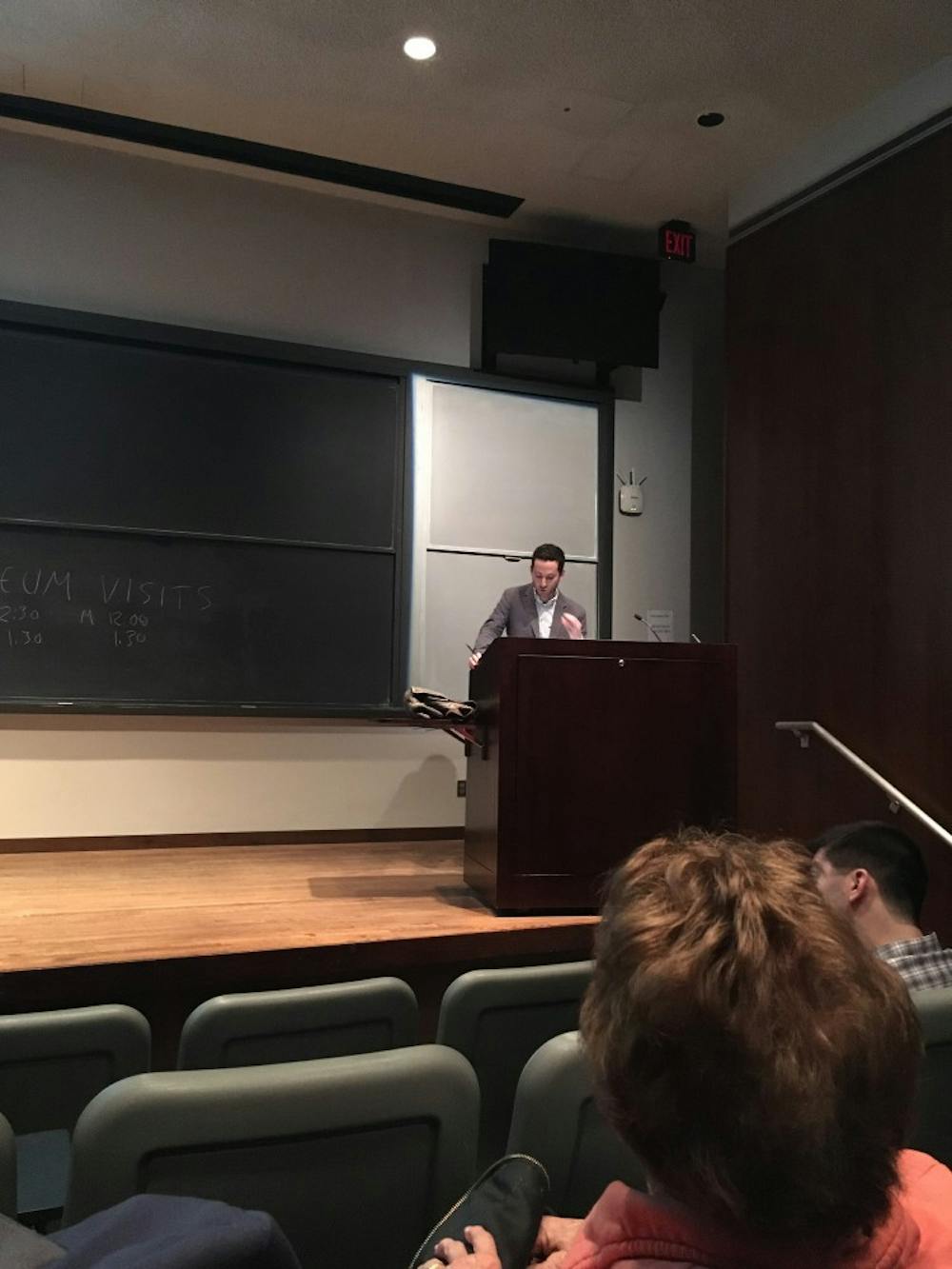Jewish culture and television took the spotlight at a talk that drew an audience old and young.
On Nov. 27, Josh Lambert, the academic director of the Yiddish Book Center and a visiting lecturer of American Studies, spoke on the modern reinvention of Jewish cultural presence in U.S. media.
Jewish culture has strongly influenced mainstream U.S. cinema since the 1940s, but many scholars at the beginning of the 21st century predicted that Jews will cease to play central roles, according to Lambert.
A 2013 Pew research study showed a decline in American Jews’ desire to affiliate. James Leoffler, a prominent scholar, published an article boldly titled “The Death of Jewish Culture.”
Lambert argued that recent years have proved the opposite to be true.
The New Yorker’s “20 Under 40” list of authors featured 10 writers who primarily write on Jewish themes. Ten of 11 best-ranked podcasts include at least one Jewish host, according to Lambert. Jewish Studies programs, like the one at the University, are a phenomenon of the past 20 years, and are growing in popularity.
Lambert used the case study of Amazon’s 2014 show “Transparent” as exemplary of the new ways in which Jewish culture manifests in media.
Emily Nussbaum, Pulitzer Prize-winning television critic for The New Yorker, called the series “the most Jewish show I’ve seen on TV.”
According to Lambert, in a move seemingly unmotivated by profits, Amazon picked up as one of its debut shows one that would likely appeal to a tiny audience: “well-educated, intellectual Jews.”
Showing multiple video clips throughout the lecture, Lambert illustrated the ways in which Jill Soloway’s “Transparent,” along with many other shows, including Netflix’s “Orange is the New Black,“ strips certain Jewish rituals of their traditional contexts and repurposes them in a creative manner.
One episode in “Transparent” featured an event titled “Torah Con Tacos,” during which one character interrupted Havdalah, the concluding ceremony of the Sabbath, to say Kaddish (a mourning prayer) for a non-Jewish friend. In another episode, in lieu of a bat mitzvah, a 13-year-old girl cathartically recited her Torah portion to a caterer, while dancing around her living room.
Another Soloway production, a film titled “Afternoon Delight,” features a reconciliation scene between a married couple in which they spontaneously recall the ritual of lighting candles on the Sabbath, grabbing two candles — one in a mason jar and the other in a beer bottle — to do so.

“‘Transparent’ was the first show made by a streaming service to receive awards normally given to cable TV shows,” said Lambert.
Despite the show’s unprecedented success in Jewish academic circles, Lambert notes that it faces “very thoughtful criticism” from many in the transgender community.
In production, Soloway did not involve the hired trans advisors until the pilot had already been filmed, and failed to cast a trans person to play the lead trans character. Lambert cited one review that labeled the show simply as “transphobic bullshit.”
Lambert also spoke of a non-profit organization Reboot, which aims to affirm the value of Jewish traditions by redesigning the methods by which American Jews can engage in them.
Every year, Reboot flies approximately 30 Jews involved in American media to a summit at a spa in Utah to discuss strategies for revitalizing Jewish culture. Lambert disclosed a conflict of interest, noting that he once participated in the summit himself.
In 2010, Reboot funded a non-traditional Sukkah design competition in New York, displaying the various constructions in Union Square during the Jewish holiday of Sukkot. The organization has also sponsored the National Day of Unplugging, an initiative to transform the obligations of the Jewish Sabbath into more manageable, modern practice.
Lambert concluded the lecture by discussing the double-edged-sword nature of such recent developments.
“I feel an ambivalence that I don’t necessarily hope to resolve,” Lambert said.
“While some viewers of ‘Transparent’ are rightly inspired by the show’s intersectional project, which attempts to bring Jewishness into conversation with trans and queer narratives, other observers may very reasonably feel disappointed by the exploitation inherent in the attempt to make Judaism compelling to general audiences by hitching its star to the narrative of a more vulnerable and more marginalized people,” he said.
The talk, entitled “Rebooting Jewish Television: ‘Transparent,’ Streaming Media, and Foundation-Backed Culture,” took place at McCormick 101 at 4:30 p.m. and was the 10th annual Lapidus Family Fund Lecture in American Jewish Studies.








